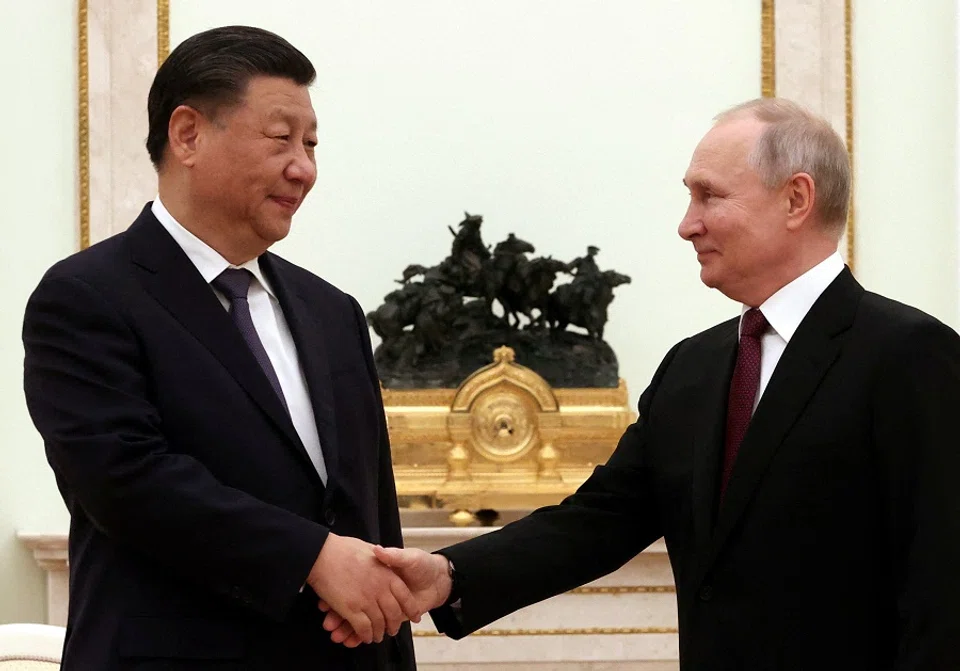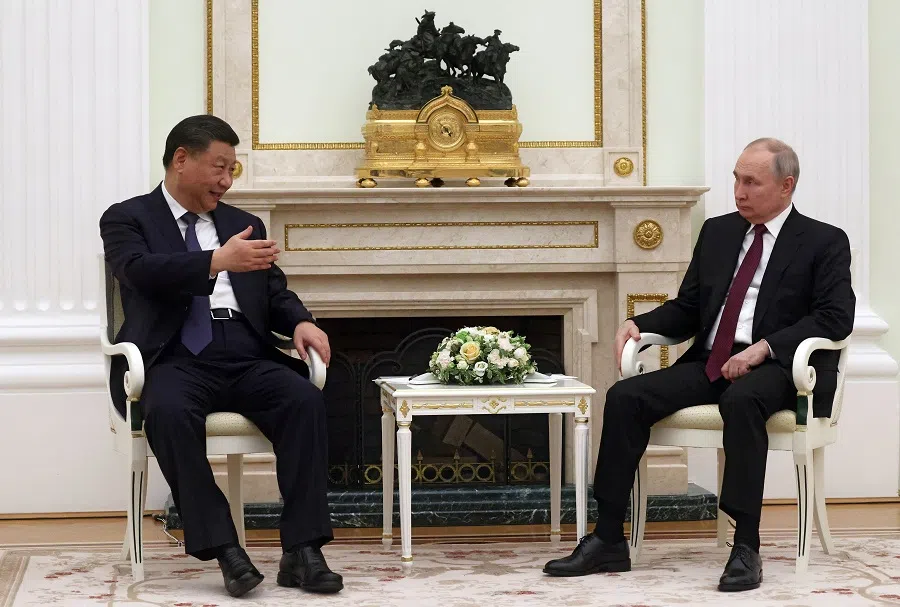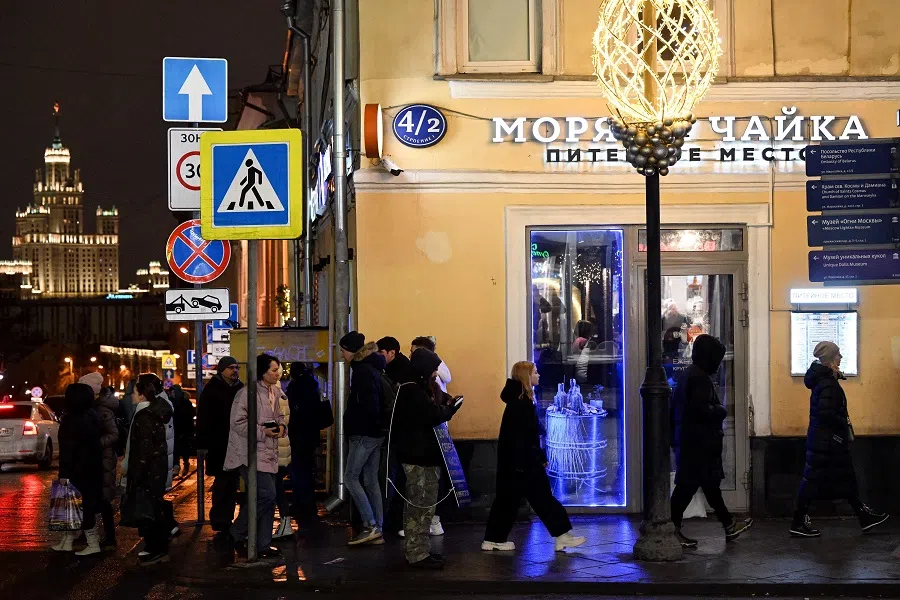President Xi in Moscow: From wolf warrior to peacemaker?
President Xi Jinping's visit to Moscow, following on the heels of China's role in brokering a Saudi-Iran deal, speaks of China's new-found confidence as a diplomatic rainmaker.

President Xi Jinping's visit to Moscow is a litmus test for China's diplomatic ambitions, showcasing a shift in Beijing's approach to major power diplomacy. Gone are the days of Deng Xiaoping's dictum to keep a low profile and bide one's time; China is now taking a more assertive stance on the world stage. The recent Iranian-Saudi detente brokered by Beijing and Xi's trip to Moscow demonstrates China's new-found confidence as a diplomatic rainmaker.
During the decade-old expansion of the Belt and Road Initiative in regions that were not willing or able to defend Chinese personnel and interest, Beijing showcased a "balanced vagueness" approach in dealing with risk and crisis management, that is, placing a bet on both sides.
This contemporary Chinese policy of non-alignment differs from its previous stance of non-interference. As an example, during the Libyan crisis, Beijing called for a multilateral solution to the civil war, making no effort to prop up one side or the other. Instead, Chinese diplomats engaged with the two warring parties, effectively placing bets on both sides.
... even a minor accomplishment between Moscow and Kyiv will reap massive benefits for Beijing's narrative in the global south.
From wolf warrior diplomacy to peacemaker
Today, China's policy of non-alignment and balanced vagueness is giving way to a bolder foreign policy aimed at restoring China's historical centrality in global affairs. This shift is already bearing fruit for China, as even a minor agreement between Russian President Vladimir Putin and Ukraine President Volodymyr Zelenskyy could elevate Xi's position both domestically and internationally, especially during the beginning of his unprecedented third term at the helm of the country.
Prior to Xi's state visit to Moscow, China's top diplomat Wang Yi floated a 12-point peace deal. Although the West has been critical of China's proposed peace deal, the success of the Iran-Saudi detente has already begun to pay off. By becoming a recognised power broker, China is positioning itself as a major player in global diplomacy.

While the Iranian-Saudi detente is a minefield for both parties involved, Beijing is already reaping the positive spillover. Likewise, even a minor accomplishment between Moscow and Kyiv will reap massive benefits for Beijing's narrative in the global south. This is a long way from Deng's "by no means should China take the lead".
Therefore, it seems that China is toning down the aggressive rhetoric and posturing of the Chinese wolf warrior diplomats in favour of a message that resonates well not only at home but also abroad. While it is too early to state if the wolf warrior diplomacy is gone for good, Zhongnanhai is sending mixed signals.
Zhao Lijian, former foreign ministry spokesman and the public face of wolf warrior assertiveness has been sent to China's remote borders as deputy head of the Department of Boundary and Ocean Affairs, a position quite far from the international media spotlight. At the same time, Foreign Minister Qin Gang, despite considering the wolf warrior concept a narrative trap, did not miss to mention that "if faced with jackals or wolves, Chinese diplomats would have no choice but to confront them head-on and protect our motherland", during his first speech as head of the Chinese Ministry of Foreign Affairs.
Also, prior to the beginning of Xi's state visit to Russia, he mentioned that ''China-Russia relations are based on no-alliance and no-confrontation, and it is not targeted at any third party'', suggesting that at the end of the Chinese state visit to Russia, a number of economic and energy cooperation deals are going to be signed cementing the Sino-Russian strategic partnership in the new era.
Notably, at the same time as Xi's talks with Putin, allegations of China providing weapons to support the Russian war effort are surfacing and the spectre of China's involvement may cloud diplomatic efforts and increase the complexity of an already volatile situation.
... Beijing's confidence and projection of power are also useful to veil the ongoing challenges to China's post-Covid economic revitalisation.
China reaping the benefits of Russia's weakened position
From a geoeconomic standpoint, the Western sanctions targeting Russia's economy have had the unintended effect of pushing Russia closer to neighbouring countries in Central Asia and the Caucasus, but it is China that stands to gain the most from Russia's weakened position.
As the US already started to point the finger at Beijing for allegedly providing dual-use technology to support Moscow's invasion of Ukraine, the lifeline that China is providing to Russia's failing economy is undeniable. However, Western sanctions are not meeting the expected results and are forcing Central Asian countries into Moscow's embrace with bilateral trade relations soaring from Dushanbe to Ashgabat.
During the meeting with Putin, Xi showcased confidence in his own position of strength. However, Beijing's confidence and projection of power are also useful to veil the ongoing challenges to China's post-Covid economic revitalisation.
China's new-found willingness to take on global responsibilities is a positive sign, and for Washington, cooperation with Beijing in reaching a positive outcome for the ongoing war in Ukraine may be an uncomfortable necessity.

Following the first day of Xi's visit, Putin's declaration of "respect" and acknowledgement of China's position as a negotiator offers limited hope. Nevertheless, it is yet to be seen how the Chinese new role as peacemaker will play in a zero-sum game with the US. Washington is already calling for a no-Chinese brokered truce or deal, as some sort of cease-fire following from the Xi-Putin meeting may simply enable the Russian forces to regroup for a spring offensive.
China's diplomatic efforts have once again grabbed the world's attention, but it's a piece of a broader puzzle. Beijing's ongoing initiative in forging new alliances in the Indo-Pacific is where the rubber meets the road. Nevertheless, China's new-found willingness to take on global responsibilities is a positive sign, and for Washington, cooperation with Beijing in reaching a positive outcome for the ongoing war in Ukraine may be an uncomfortable necessity. Cooperation with Beijing may be the starting point for broader collaboration, including tackling issues such as non-nuclear proliferation and Putin's Damocles sword of nuclear escalation.


![[Big read] When the Arctic opens, what happens to Singapore?](https://cassette.sphdigital.com.sg/image/thinkchina/da65edebca34645c711c55e83e9877109b3c53847ebb1305573974651df1d13a)


![[Video] George Yeo: America’s deep pain — and why China won’t colonise](https://cassette.sphdigital.com.sg/image/thinkchina/15083e45d96c12390bdea6af2daf19fd9fcd875aa44a0f92796f34e3dad561cc)